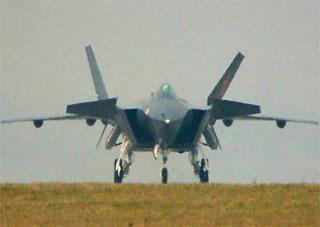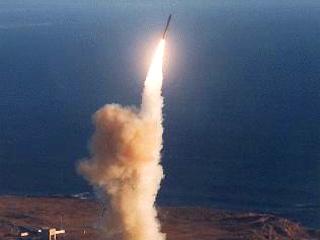
BEIJING (PTI): China’s radar evading stealth fighter that made its high-profile debut coinciding with the visit of US Defence Secretary Robert Gates may take three to four years before it actually becomes operational, official media reports here said.
Yang Yao, one of China’s top test pilots told state run Global Times that after the maiden flight, the J-20 will undergo a battery of tests prior to being approved for use in the field, a process that usually lasts at least three years.
"After that, at least another year is needed before full production of the plane. Then the Chinese pilots will need to learn how to manoeuvre this new-generation fighter aircraft, which will take a certain amount of time," he said.
It is perhaps extraordinary that Chinese President Hu Jintao himself confirmed Tuesday’s test flight of the J-20 during his meeting with Gates.
"I asked President Hu about it directly, and he said that the test had absolutely nothing to do with my visit and had been a pre-planned test. And that's where we left it," Gates later told reporters.
Before that, Chinese official media launched a high voltage campaign saying the flight "reportedly" test flown for 15 minutes. All official media websites were agog with reports and some even with the video footage of the plane conducting the trial run, presumably at Changdu air base where it was being developed.
Ni Feng, a researcher of US Studies at the Chinese Academy of Social Sciences said the timing of the test flight to coincide with Gates' visit showed the confidence the military has in the project.
"The timing of the J-20's maiden flight is a coincidence, but it showed that China is more confident and honest in unveiling its military progress. This is a step forward for promoting mutual trust with other major players in the global community," he said.
Gary Li, a China expert with the London-based International Institute for Strategic Studies, called the exposure a sign of "unofficial transparency".
"The PLA (People's Liberation Army) would not have decided to unveil such a leap in aeronautical development in such a manner if they were not confident about it," Li said.
He was apparently referring to comments by some analysts that China has not yet produced an engine for its home-made fighter jets, including the J-10 being manufactured in collaboration with Pakistan. Its engines are imported from Russia.
Refuting this, the official newspaper China Daily said days ahead of the flight, China's Central Military Commission had awarded a first-class merit to Gan Xiaohua, an aircraft engine expert from a PLA Air Force equipment research institute, on January 6.
It is perhaps an indication that China might have developed the engine too, though the daily did not mention it.
"Many analysts and Chinese netizens regarded the award as a positive sign that implied the country had achieved a remarkable advance in the aircraft engine field," it said.
The Chinese media also highlighted reports from the US that J-20 may be superior to US Air Force's stealth fighter F-22 Raptor.
Due to defence cuts, the US has ceased the production of F-22 in favour of F-35, a cheaper fifth-generation fighter jet that has fewer capabilities.
Global Times quoted retired US Air Force Lieutenant General Thomas McInerney as saying that the F-35 will be no match for the J-20, repeating his call for inserting funding for F-22s into the Pentagon's defence budget for 2011.
It also quoted Carlo Kopp and Peter Goon, partners in the Air Power Australia think-tank as saying that the US Navy's F/A-18 Super Hornets and the F-35 fighter jets are "aerodynamically and kinematically quite inferior" to the J-20.
They claimed that due to the J-20's larger size, the Chinese plane would be optimally designed for fast, high-altitude interception using long-range missiles, as opposed to close-range dog fighting, it said.
Li Daguang, a military expert at the PLA National Defence University, however, disagreed with those predicting the potential outcome of battles between the J-20 and F-22.
"It is too early to say whether the J-20 can challenge the F-22, since we don't have any technical details for the Chinese plane. I also have doubts over the plane's stealth capability," he said.
"The J-20 is definitely stronger than previous Chinese jets, but one plane's development doesn't necessarily bring about great progress in the country's overall air strength," he added.
The US-based Aviation Weekly reported that, based on the pictures, the J-20 jet has features that make it less compatible with stealth activities.
"The J-20 may not match the all-aspect stealth of the F-22," it said.
Some analysts said the J-20, with a larger size and a higher ground clearance than the F-22, might be a mixture of a stealth jet and a bomber.
 Previous Article
Previous Article Next Article
Next Article












The Indian Air Force, in its flight trials evaluation report submitted before the Defence Ministry l..
view articleAn insight into the Medium Multi-Role Combat Aircraft competition...
view articleSky enthusiasts can now spot the International Space Station (ISS) commanded by Indian-American astr..
view article